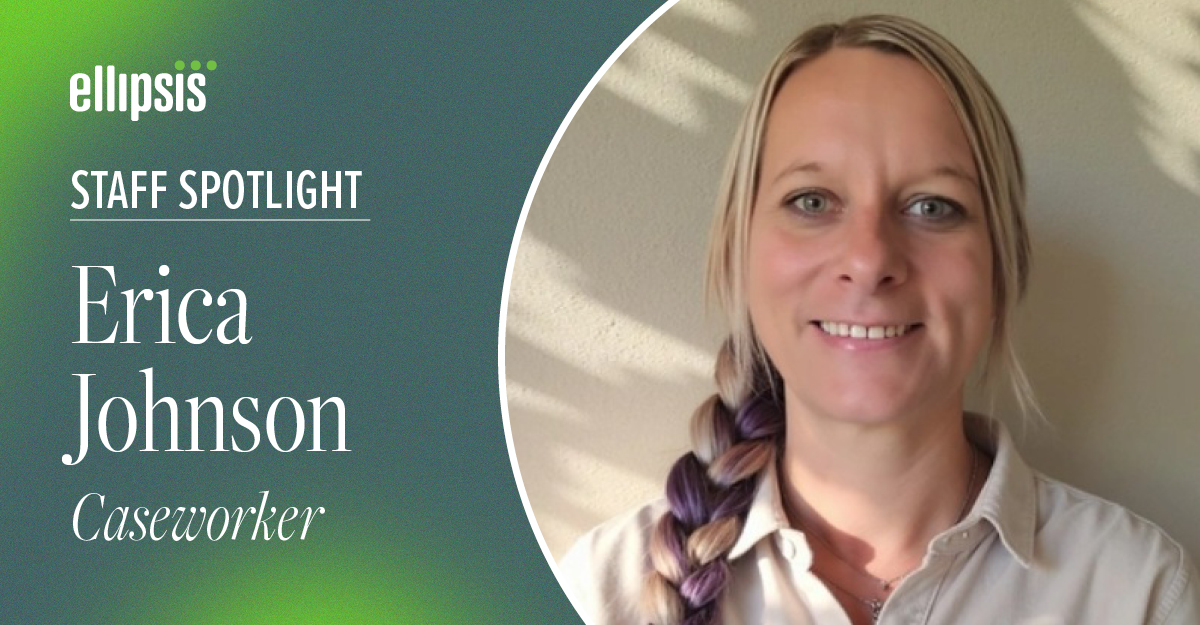We’re excited to spotlight Erica Johnson, a caseworker in our Qualified Residential Treatment Program (QRTP) for boys. For nearly four years with Ellipsis, Erica has guided young people through some of life’s most challenging transitions — pairing structure with empathy to help them gain confidence, stability and independence. Her story reflects not only the heart of our mission but also the power of showing up for the youth who need it most.

What is your position with Ellipsis, and what does a typical day look like for you?
I’m a caseworker in a QRTP for boys. I work closely with youth, families and multidisciplinary stakeholders to ensure each client receives individualized, trauma-informed care aligned with their treatment plan.
My responsibilities include facilitating regular meetings with youth and their support teams to assess progress and adjust treatment goals as needed, assisting younger youth in identifying and modifying problematic behaviors to promote reunification with family or transition out of care, and supporting older youth with pre-independent living skills.
How long have you worked here, and what initially drew you to Ellipsis?
It’s been almost four years. I was drawn to Ellipsis through my passion for advocating within the youth care system and my commitment to making a meaningful difference in the lives of young people.
From the beginning of my career as a youth care worker to my current role as a QRTP caseworker, I have remained dedicated to supporting youth through trauma-informed, individualized care. My goal has always been to help youth navigate their challenges, build on their strengths and move toward a more stable, hopeful future.
Have you had any other roles at Ellipsis? How has your journey within the organization shaped your perspective on the need for the programs and services the organization provides?
I’ve had two roles before my current one at Ellipsis. I’ve served as an independent living caseworker and youth care worker.
My journey within the QRTP and Supervised Apartment Living (SAL) programs has been transformative, both professionally and personally. Initially, I understood the importance of behavioral health services in theory, but working directly with youth and families has deepened my appreciation for the critical role these programs play in healing and empowerment.
Every day, I witness the resilience of individuals navigating trauma, mental health challenges and systemic barriers. These experiences have shown me our services are not just helpful — they are essential. The structured support, therapeutic interventions and individualized care plans provide a lifeline for many who might otherwise fall through the cracks.
Being part of the organization has also exposed me to the broader gaps in our community resources.
Please share a story about an experience that reaffirmed why you do this work. What made it so meaningful?
While working in SAL, I supported a client who had recently transitioned out of our Cluster SAL program into his first independent apartment. I guided him through the housing application process, coordinated his move and provided ongoing assistance as he navigated the challenges of living independently.
This included helping him search for employment, understand budgeting and daily responsibilities, and develop the confidence to manage real-world issues on his own. My role was to empower him with the tools and mindset needed for sustainable independence, and it was deeply rewarding to witness his growth during this critical life transition.
What are some of the biggest challenges you face in this job, and how do you overcome them?
The biggest challenge I face in this line of work is coming to terms with the reality that we won’t be able to help every child out there lead a better, more meaningful life.
What’s one thing you wish more people understood about the work you do?
Despite our best efforts, some outcomes remain beyond our control, yet this does not diminish my purpose. Each day, I choose to show up and try again. The youth we reach matter deeply, and they make all the effort worth it.
If you could describe your job in three words, what would they be and why?
Support, structure and healing. Our youth face trauma, instability and emotional challenges, and it is our job not only to support them but also to provide the structure that builds trusting relationships and creates interactions for healing, moving toward a healthier future.
What’s one piece of advice you’d give to someone considering a career in youth services or mental health support?
Working in youth services or mental health support is deeply rewarding, but it can also be emotionally intense, unpredictable and, at times, heartbreaking. The one thing that will carry you through is a clear sense of purpose. A person in this field must understand their “why” and be involved for the right reasons.
What’s one thing about Ellipsis that makes you most proud to be part of the team?
Every day, I’m reminded that I’m not alone in this work. I have people in my corner who genuinely want to see me succeed. Whether it’s guidance during tough moments or encouragement when I need a boost, the support I’ve received has made all the difference.
Outside of work, what’s something that brings you joy?
Outside of work, I find joy in creating lasting memories with the people around me. Whether it’s a spontaneous adventure or a quiet moment, I believe every experience holds the potential to become something unforgettable. I strive to live fully, embrace the present and turn even the simplest moments into meaningful memories.
Read more staff spotlights on our blog.
